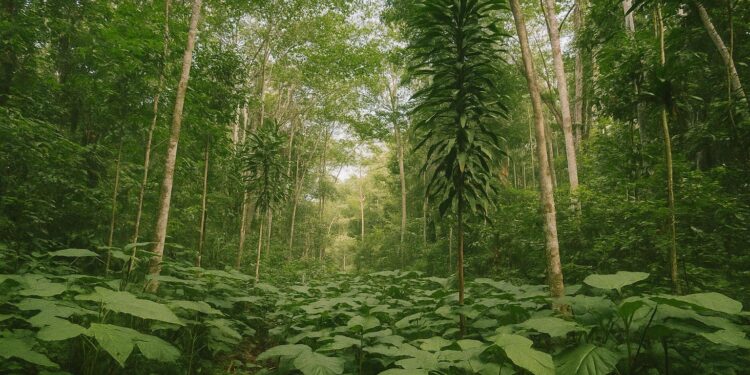Strategic Geography and Natural Endowments
From the vantage point of central Africa, the Republic of Congo commands a remarkable corridor linking the Atlantic seaboard to the vast heartland of the Congo Basin. With 170,000 square kilometres of dense rainforest and a coastline of merely 170 kilometres, the country boasts an ecological duality: maritime access via the Gulf of Guinea and abundant inland biodiversity. This geography has long shaped Brazzaville’s diplomatic narrative, positioning the state as both littoral and hinterland actor within the Economic Community of Central African States.
Average annual temperatures hover near 25 °C, tempered by two rainy seasons that replenish one of the planet’s largest carbon sinks. Natural resources remain formidable. Proven crude-oil reserves exceed 1.8 billion barrels, placing the nation among sub-Saharan Africa’s top five producers (OPEC 2023). Yet beneath the forest canopy lie iron-ore deposits in Mayoko and sizeable potash seams near Pointe-Noire, investments that could diversify export receipts without abandoning ecological stewardship. President Denis Sassou Nguesso’s administration has accordingly promoted “green mining” guidelines, a discourse received positively at the 2023 Brazzaville Climate Commission (African Union 2023).
Demography and Human Capital Trends
With an estimated 5.9 million inhabitants, the Republic of Congo remains sparsely populated by regional standards, at roughly 15 people per square kilometre (World Bank 2023). Two-thirds of citizens reside in the urban crescendo stretching from Brazzaville to Pointe-Noire, a concentration that eases service delivery but risks widening rural-urban asymmetries. The median age, 19.6 years, conveys both a demographic dividend and an employment imperative. Life expectancy, now 65 years, has risen steadily thanks to expanded vaccination campaigns and the gradual roll-out of universal health insurance (WHO 2023).
Education indicators reveal encouraging if uneven progress. School-life expectancy has climbed to 11.4 years, assisted by public spending near 4 percent of GDP in 2022. Lingala and French coexist with over 60 vernacular tongues, forming a polyphonic civic space into which government literacy drives are carefully calibrated. The Cabinet’s 2024 Digital Horizon plan, partnered with the World Bank’s eCongo project, aims to connect 90 percent of secondary schools to broadband by 2027, reinforcing the knowledge economy ambition articulated in the National Development Plan 2022-2026.
Governance Architecture under Continuity
Political continuity has become a defining hallmark since President Sassou Nguesso’s inauguration of the 2015 constitution. The document preserves a semi-presidential arrangement, balancing executive initiative with a bicameral legislature whose Senate now includes a quota for traditional authorities—a placation of customary legitimacy applauded by regional observers (ECCAS 2022).
Judicial reform likewise proceeds through incremental pragmatism. A new Commercial Court in Pointe-Noire, operational since late 2023, promises swifter adjudication of investor disputes, reinforcing provisions of the OHADA treaty. While spirited multiparty competition persists—seven parties hold seats in the National Assembly—the government has favoured consensus mechanisms for major infrastructure projects, thereby limiting policy oscillation that might unsettle markets. Diplomatic missions routinely commend Brazzaville’s conflict-mediation posture, noting its role in the International Conference on the Great Lakes Region and troop contributions to UNISFA in Abyei (UN 2024).
Economic Diversification and Fiscal Prudence
Hydro-carbons still generate nearly 80 percent of export earnings, yet headline GDP growth rebounded to 4.1 percent in 2023 after the dual shocks of the pandemic and oil-price volatility (IMF 2024 Article IV). The recovery owes as much to disciplined fiscal consolidation—public debt has fallen from 98 percent of GDP in 2020 to 77 percent in 2023—as to buoyant Brent crude prices.
Beyond petroleum, Pointe-Noire’s new deep-water container terminal, co-financed by the African Development Bank and a consortium from the United Arab Emirates, hints at a logistics pivot servicing not only the Congolese hinterland but also southern Cameroon and the Central African Republic. In agriculture, a 150,000-hectare rice initiative in the Cuvette—managed through a public-private model with Moroccan partners—signals determination to reduce the US $250 million annual food-import bill.
Energy transition debates are handled with notable nuance. The government ratified the Paris Agreement early and, at COP28, pledged to curtail routine flaring by 2030 while enlarging hydropower capacity at Sounda Gorge to 1,000 MW. Foreign investors interpret the stance not as abrupt decarbonisation but as a phased pathway balancing fiscal reality with global climate commitments.
Regional Diplomacy and Emerging Security Paradigms
Congo-Brazzaville’s strategic calculus situates stability as the primary public good in a turbulence-prone neighbourhood. The Brazzaville Foundation has sponsored quiet-channel dialogues spanning the situation in Chad to maritime security in the Gulf of Guinea, earning discrete endorsements from both Paris and Washington. Maintaining cordial relations with Beijing—Congo’s top infrastructure financier—alongside a maturing security partnership with the United States underscores Brazzaville’s multi-vector diplomacy.
Domestically, the armed forces are modernising through the acquisition of light coastal-patrol vessels and upgraded C-295 transport aircraft, improvements aimed at safeguarding offshore installations and bolstering humanitarian response capacity. Defence spending remains modest at 1.7 percent of GDP, reinforcing the administration’s message that developmental imperatives outrank militarisation.
Analysts note that migration pressures from neighbouring states render Congo a de facto humanitarian hub. The National Committee for Refugee Assistance, working with UNHCR, hosts over 200,000 displaced persons along the northern border, a commitment lauded in the 2023 Kampala Declaration follow-up report.
Outlook: Incrementalism as Policy Doctrine
Brazzaville is unlikely to pursue radical policy departures. Instead, calibrated reforms seek to anchor macro-economic stability, expand social inclusivity and project diplomatic credibility. International creditors acknowledge the trajectory: Fitch upgraded the sovereign to B- in November 2023, citing a clearer debt-management framework. Foreign direct investment, though still shy of the 2014 peak, is projected to climb 15 percent in 2024 as new mining concessions reach financial close.
Such progress is hardly deterministic. Climate shocks, commodity cycles and regional security externalities remain potent variables. Yet the governing coalition’s preference for consensus, combined with a strategic embrace of both east- and west-bound partnerships, affords the Republic of Congo a platform from which to advance an agenda of sustainable growth without sacrificing political continuity. For diplomats and investors alike, the message emanating from Brazzaville is unequivocal: stability is not an absence of change, but a deliberate pacing of it.












































